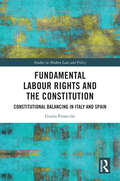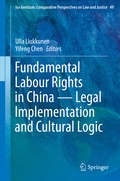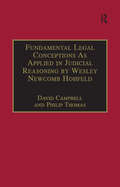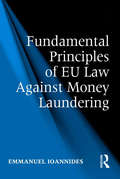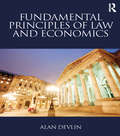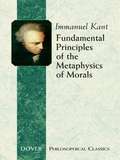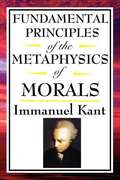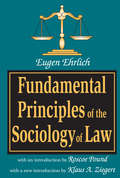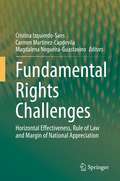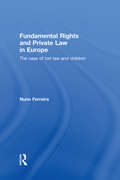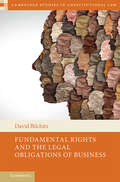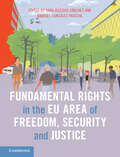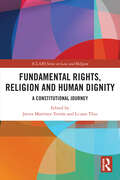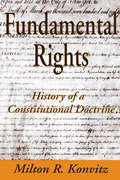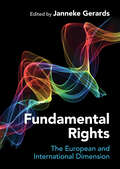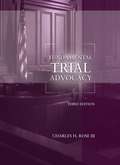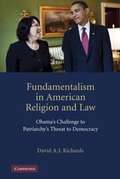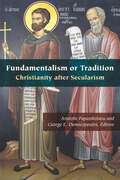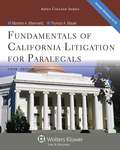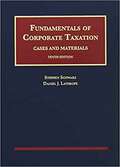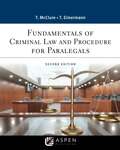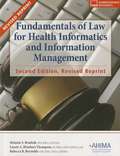- Table View
- List View
Fundamental Labour Rights and the Constitution: Constitutional Balancing in Italy and Spain (Studies in Modern Law and Policy)
by Giulia FrosecchiThis book reflects on constitutional balancing from the perspective of fundamental labour rights. It draws on neo-constitutional theories and builds on the assumption that fundamental labour rights, understood as rights aimed at protecting workers during their working life or after retirement, are the normative expression of founding values and can be balanced against equally axiological constitutional principles. The balancing of constitutional labour rights can be conducted by various institutional actors and by applying different techniques. This volume reviews the theoretical debates on judicial balancing and the approaches adopted by the Court of Justice of the European Union and the European Court of Human Rights, to proceed with a closer assessment of Italian and Spanish judicial traditions. In particular, it addresses the main profiles of the case law of the Italian and Spanish Constitutional Courts on labour and social law reforms adopted in the aftermath of the 2008 crisis, where balancing takes place between labour rights and economic principles. The analysis is focused on four main aspects: the fundamental labour rights in the balance; the role of the Courts; the technique applied by the Judges; and the constitutional interests subject to the balancing. It ultimately reveals that the axiological nature of fundamental labour rights is preserved and the economic and financial contingencies confirm their factual character, although they are occasionally recognised a prominent role in the ratio decidendi. The book will be a valuable resource for academics and researchers working in the areas of labour law, social security law, legal theory and constitutional law.
Fundamental Labour Rights in China - Legal Implementation and Cultural Logic
by Ulla Liukkunen Yifeng ChenThis volume gathers together chapters that address the theme of implementing fundamental labour rights in China. It explores the legal framework as well as key institutions and other actors along with the socio-economic context involved in interpretation, implementation, enforcement and overall promotion of fundamental labour rights in China. As a collection of chapters, it assembles comparative and mutually complementary perspectives and insights by distinguished scholars from China, Europe and the United States. With its broad perspective on implementation, the book discusses the most topical challenges to realizing fundamental labour rights in China. China was among the founding members of the ILO. With the regulatory approach of the ILO, fundamental labour rights have gained a new foothold as a key pillar in managing the social dimension of globalization. The development of fundamental labour rights protection in China can be viewed as part of a larger development within China's domestic economic and social transition as well as its integration into the global economic system. While China has ratified four of the eight ILO core conventions, the challenge of effective implementation and enforcement in the domestic context remains. With its in-depth research on fundamental labour rights in the particular cultural context of the Chinese experience, this book studies Chinese labour law from multiple perspectives, at the same time examining the wider role of international labour standards in developing Chinese law and society. This volume is a remarkable enlargement of existing scholarship on international labour standards, on the one hand, and fundamental labour rights in China on the other. These chapters thoroughly analyse the legal and institutional framework for implementing labour law in China. Among the topics covered are fundamental labour rights including freedom from forced labour, prohibition of use of child labour and non-discrimination. In addition, this volume benefits from socio-historical observations on the cultural logics that inform implementation of fundamental labour rights in China in which the history and current development of Chinese labour law are equally reflected with substantive depth.
Fundamental Legal Conceptions As Applied in Judicial Reasoning by Wesley Newcomb Hohfeld (Classical Jurisprudence Series)
by David Campbell Philip ThomasWesley Newcomb Hohfeld, born in 1879, died prematurely in 1918. He left only a few law journal articles as his published work. His 'Fundamental Legal Conceptions', originally published as two articles in the 'Yale Law Journal' for 1913 and 1917 and left incompletely revised at his death is, however, one of the principal foundations of analytic jurisprudence. The analysis of rights that Hohfeld offers is still regularly cited and relied upon by both lawyers and philosophers, and it is treated as a source of insight into the nature of moral rights as well as the legal rights that were Hohfeld’s own focus of concern. Although some of his analytical distinctions were anticipated by earlier jurists, their insights were fragmentary and imperfect by comparison. Hohfeld’s systematic and exhaustive (yet concise) treatment is generally regarded as unsurpassed. This is not to say that he has not been criticized, but his book forms the essential starting point for any discussion of the nature and structure of rights. 'Fundamental Legal Conceptions' has long been difficult to obtain. This new edition makes this classic of analytic jurisprudence available with a comprehensive introduction by Dr. N.E. Simmonds of Corpus Christi, University of Cambridge, UK.
Fundamental Principles of EU Law Against Money Laundering
by Emmanuel IoannidesThis book critically analyses fundamental principles of EU law for the control of international economic crime. Discussing how the reporting system and the exchange of information are at the heart of the global anti-money laundering regime, the study also looks at the inferential force of financial intelligence in criminal proceedings and the responsibilities this places on prosecutors and criminals alike. The author closely examines the application of Article 8(2) of the European Court of Human Rights for the retention and movement of the fingerprints, cellular samples and DNA profiles of unconvicted persons, and argues the incompatibility with the ECHR, along with the effect of socially stigmatising unconvicted persons. The work concludes with exploring how financial regulation has, inter alia, shifted responsibility to businesses and financial institutions to become more transparent and accountable to financial regulators and tax authorities. This critical analysis is essential reading for law students and the Judicial Body, as well as financial crime investigators and regulators.
Fundamental Principles of Law and Economics
by Alan DevlinThis textbook places the relationship between law and economics in its international context, explaining the fundamentals of this increasingly important area of teaching and research in an accessible and straightforward manner. In presenting the subject, Alan Devlin draws on the neoclassical tradition of economic analysis of law while also showcasing cutting- edge developments, such as the rise of behavioural economic theories of law. Key features of this innovative book include: case law, directives, regulations, and statistics from EU, UK, and US jurisdictions are presented clearly and contextualised for law students, showing how law and economics theory can be understood in practice; succinct end- of-chapter summaries highlight the essential points in each chapter to focus student learning; further reading is provided at the end of each chapter to guide independent research. Making use of tables and diagrams throughout to facilitate understanding, this text provides a comprehensive overview of law-and-economics that is ideal for those new to the subject and for use as a course text for law-and-economics modules.
Fundamental Principles of the Metaphysics of Morals
by Immanuel KantWhat is morally permissible, and what is morally obligatory? These questions form the core of a vast amount of philosophical reasoning. In his Fundamental Principles of the Metaphysics of Morals, Immanuel Kant developed a basis for the answers.In this landmark work, the German philosopher asks what sort of maxim might function as a guide to appropriate action under a given set of circumstances. By universalizing such a maxim, would morally permissible behavior not become clear? Suppose that everyone were to behave in accordance with this maxim. If everyone followed the maxim in the same way without harm to civilized culture, then the behavior would be morally permissible. But what if no one followed the maxim? Would civilization thereby be at risk? In such a case, the behavior would be morally obligatory.Kant's test, known as the Categorical Imperative, is a logical proof of the Golden Rule and the centerpiece of this work. It constitutes his best-known contribution to ethical discussion, and a familiarity with his reasoning in this book is essential to students of philosophy, religion, and history.
Fundamental Principles of the Metaphysics of Morals
by Immanuel KantKant's Fundamental Principles of the Metaphysics of Morals is one of the most important works in modern moral philosophy. It belongs beside Plato, Aristotle, Machiavelli, and Hobbes. Here Kant sets out to articulate and defend the Categorical Imperative-- the fundamental principle that underlies moral reasoning-- and to lay the foundation for a comprehensive account of justice and human virtues.
Fundamental Principles of the Sociology of Law
by Eugene Ehrlich Klaus A. ZiegertThe innovative and revolutionary scholarship of the eminent Austrian legal theorist and professor of Roman law, Eugen Ehrlich (1862-1922), is of a very high caliber. His work has not only held its place well in view of what legal theory, especially sociological legal theory, has to offer, but is also still a powerful challenge to positions in legal theory that are no longer defensible. The sociology of law has followed in a direct line of succession from Ehrlich's observations and ideas as a new and special discipline linking jurisprudence with sociology.
Fundamental Rights Challenges: Horizontal Effectiveness, Rule of Law and Margin of National Appreciation
by Cristina Izquierdo-Sans Carmen Martínez-Capdevila Magdalena Nogueira-GuastavinoThis book presents a comprehensive review of fundamental rights issues that are currently in the spotlight. The first part explores why the question of whether or not fundamental rights have horizontal effect is a topic of endless debate. The second part focuses on human rights and the rule of law. It begins by arguing that the hitherto valid model of the rule of law is now outdated, and then goes on to outline the importance of the judicial dimension in countering threats to the independence of the judiciary. Lastly, the third part addresses a classic issue in the field of human rights: states’ margin of appreciation, highlighting two aspects: (i) the elements used by the ECJ to determine the scope of the margin of appreciation, which varies depending on the subject matter, the nature of the right in question, as well as the severity and the purpose of the interference; and (ii) the margin of appreciation enjoyed by national courts when interpreting the law. Exploring current issues concerning a topic of eternal interest, the book will appeal to scholars and practitioners alike. Written by formidable intellectual talents, committed to the study of fundamental rights, it rigorously analyses the most recent judgments of both the ECJ and the ECHR.
Fundamental Rights and Private Law in Europe: The Case of Tort Law and Children
by Nuno FerreiraThe book explores, from a comparative and inter-disciplinary perspective, the relationship between fundamental rights and private law in Europe, a debate usually referred to as Drittwirkung or ‘horizontal effect of fundamental rights’. It discusses the different models of ‘horizontal effect’ and the impact that fundamental rights may have in shaping tort law, especially the position of child tortfeasors. The book concentrates on several European jurisdictions, namely France, Italy, Germany, Portugal, Sweden, Finland, and England and Wales. At a crossroad between human rights and European private law, this study draws insights from several legal fields (international, European, tort, constitutional and child law), sociology, psychology, and feminist studies. It also considers policy implications and advances proposals which would ensure the optimisation of the effect, and maximisation of the effectiveness, of fundamental rights in tort law, and more generally in private law. This book departs from traditional legal doctrines and offers a more pragmatic, comprehensive and just legal analysis of the role of fundamental rights in private law. It will be of interest to undergraduate and postgraduate students, academics, practitioners, policy-makers and activists with an interest in human rights, tort law, comparative law, children’s rights and European private law.
Fundamental Rights and the Legal Obligations of Business (Cambridge Studies in Constitutional Law)
by David BilchitzCorporations can significantly affect the fundamental rights of individuals. This book investigates what legal obligations they have to respect, protect and realise these rights. In doing so, it addresses important conceptual issues surrounding fundamental rights. From an investigation of existing legal models, a clear structural similarity surfaces in how courts make decisions about corporate obligations. The book seeks to systematise, justify and develop this emergent 'multi-factoral approach' through examining key factors for determining the substantive content of corporate obligations. The book defends the use of the proportionality test for ascertaining corporations' negative obligations and outlines a novel seven-step test for determining their positive obligations. The book finally proposes legal and institutional reforms - on both the national and international levels - designed to enhance the quality of decision-making surrounding corporate obligations, and embed fundamental rights within the corporate structure and the minds of key decision-makers.
Fundamental Rights in the EU Area of Freedom, Security and Justice
by Sara Iglesias Sánchez Maribel González PascualThe development of the Area of Freedom, Security and Justice has transformed the European Union and placed fundamental rights at the core of EU integration and its principles of mutual recognition and trust. The impact of the AFSJ in the development of an EU standard of fundamental rights, which has come to the fore since the Treaty of Lisbon, is a topic of great theoretical and practical importance. This is the first systematic academic study of the AFSJ and its implications from the point of view of fundamental rights. The contributions to this collection examine the normative and jurisprudential development of the AFSJ in order to assess its effects on the overall construction of the scope and standards of protection of EU fundamental rights in this particularly complex and sensitive field of integration. The expert contributors systematically map and critically assess this area of EU law, together with the relevant case-law.
Fundamental Rights, Religion and Human Dignity: A Constitutional Journey (ICLARS Series on Law and Religion)
by Javier Martínez-Torrón and Li-ann ThioThis collection examines theoretical and practical issues concerning the relationship between freedom of religion or belief and other fundamental rights, in the context of secular States, from the perspective of human dignity.As the Universal Declaration of Human Rights made clear, human dignity constitutes the foundation of human rights, among which freedom of thought, conscience, and religion occupies a prominent place. As a consequence of the inter-cultural debate that is ongoing in contemporary Western societies, which are increasingly pluralistic, the concept of human dignity faces important challenges in terms of what it requires. The five chapters included in the first part of this book discuss some of these conceptual challenges, such as the implications of common good constitutionalism for the understanding of human dignity and the role of religious freedom from the perspective of Western experiences and legal thinkers. The chapters in Part II explore particular questions involving human dignity and the relationship between freedom of religion or belief and other human rights, for example, how to build bridges between religious freedom and other fundamental freedoms when people make conflicting legitimate choices. Taken together, the book offers an insightful range of perspectives on some contemporary challenges raised by the exercise of religious freedom in societies that claim to be based on respect for human dignity and human rights.The volume will be a valuable resource for academics, researchers, and policy-makers working in the areas of Law and Religion, Human Rights Law, Constitutional Law, and International Relations.
Fundamental Rights: History of a Constitutional Doctrine
by Milton KonvitzOne of the most important modern developments in American constitutional law has been the extension of the Bill of Rights to the states. The most important guarantees of the first eight amendments have been incorporated into the Due Process Clause of the Fourteenth Amendment, along with the doctrine that these are rights that are so "fundamental" that any restriction is subject to judicial "strict scrutiny." The process has nationalized fundamental rights, giving them a preferred dignity and majesty. In this volume, the renowned constitutional scholar, Milton Konvitz, traces the development of fundamental rights from the early days of American jurisprudence through twentieth-century cases involving the right to privacy, racial discrimination, voting rights, censorship, and abortion laws. In Konvitz's astute view, the Bill of Rights in the Constitution of the United States, like the Ten Commandments, places no priority among protected or guaranteed rights. He argues that values, ideals, rights, liberties, and privileges need to be placed in a hierarchical order or scale. The Supreme Court, acting on a case-by-case basis, has slowly and cautiously moved to designate some rights as superior to others. This idea that some rights are of a "fundamental" nature, while others are not, can be traced back to the early days of the nation's government. Konvitz shows that there may be said to be not one, but two or even three bills of rights, one for the Federal government and one for the States. Still another, may be an unwritten but evolving Bill of Rights. The Court has recognized rights or liberties that are in no written constitution, as for example, a right to marry, a right to have a family, a right to choose education of one's children in a private, even a religious, school, rather than a public school. In an illuminating fashion, Konvitz, whose writings have been cited in Supreme Court decisions, traces the controversial and very uneven line of development of
Fundamental Social Rights at Work in the European Community (Routledge Revivals)
by Alan C. NealFirst published in 1999, this volume examines how the challenge of defining and developing an effective structure of fundamental social rights for workers has long been a focus for debate at European level. Even before the emergence of the 1989 Charter of Fundamental Social Rights of Workers, proposals were being made to incorporate 'fundamental rights' provisions into the Treaties establishing the European Communities. Consequently, when a distinguished Comité des Sages produced its 1996 report For a Europe of Civic and Social Rights, the stage was set for intensive debate as to the way forward.
Fundamental Trial Advocacy (American Casebook Series)
by Charles RoseThis book builds upon the success of earlier editions, providing a structure that is scalable regardless of the type of case an advocate finds themselves confronting. The focus on case analysis remains a strong point in the 3rd edition, with additional online resources included to truly immerse the student in every fundamental advocacy skill discussed in the text. Students can enter the text where they see fit, focusing immediately upon the specific skill they wish to develop. <P><P>The book is written holistically, with a commitment to the development of core competencies and advocacy skills interwoven throughout the text. This allows the advocate using the text to learn fundamentals and overarching concepts at the same time - greatly increasing their initial understanding and depth of learning. <P><P>This book is fundamentally different from any other advocacy book on the shelves today, and it is a difference that matters. The commitment to structure has resulted in an approach that unlocks the legal storyteller within every advocate studying the text. They are set free to tell stories that matter, ask questions that are necessary, and deliver arguments that move others, the essence of advocacy.
Fundamentalism In American Religion And Law
by David A. J. RichardsWhy, from Reagan to George Bush, have fundamentalists in religion and in law (originalists) exercised such political power and influence in the United States? Why has the Republican Party forged an ideology of judicial appointments (originalism) hostile to abortion and gay rights? Why and how did Barack Obama distinguish himself among Democratic candidates not only by his opposition to the Iraq war but by his opposition to originalism? This book argues that fundamentalism in both religion and law threatens democratic values and draws its appeal from a patriarchal psychology still alive in our personal and political lives and at threat from the constitutional developments since the 1960s. The argument analyzes this psychology (based on traumatic loss in intimate life) and resistance to it (based on the love of equals). Obama's resistance to originalism arises from his developmental history as a democratic, as opposed to patriarchal, man who resists the patriarchal demands on men and women that originalism enforces - in particular, the patriarchal love laws that tell people who and how and how much they may love.
Fundamentalism or Tradition: Christianity after Secularism (Orthodox Christianity and Contemporary Thought)
by Aristotle Papanikolaou and George E. DemacopoulosTraditional, secular, and fundamentalist—all three categories are contested, yet in their contestation they shape our sensibilities and are mutually implicated, the one with the others. This interplay brings to the foreground more than ever the question of what it means to think and live as Tradition. The Orthodox theologians of the twentieth century, in particular, have emphasized Tradition not as a dead letter but as a living presence of the Holy Spirit. But how can we discern Tradition as living discernment from fundamentalism? What does it mean to live in Tradition when surrounded by something like the “secular”? These essays interrogate these mutual implications, beginning from the understanding that whatever secular or fundamentalist may mean, they are not Tradition, which is historical, particularistic, in motion, ambiguous and pluralistic, but simultaneously not relativistic.Contributors: R. Scott Appleby, Nikolaos Asproulis, Brandon Gallaher, Paul J. Griffiths, Vigen Guroian, Dellas Oliver Herbel, Edith M. Humphrey, Slavica Jakelić, Nadieszda Kizenko, Wendy Mayer, Brenna Moore, Graham Ward, Darlene Fozard Weaver
Fundamentals Of California Litigation For Paralegals
by Thomas A. Mauet Marlene MaerowitzFundamentals of California Litigation for Paralegals offers a complete understanding of the litigation process from the time the client walks into the office through trial and post-judgment. Its balanced approach does not oversimplify the process, but covers the right amount of rules and procedures for students to embrace. Tailored to the California rules, each chapter references the specific California statute where further information can be found. California forms are included throughout the text. Abundant study aids make the material highly accessible and include bold-face terms defined in the glossary; numerous examples, charts, checklists, and sample documents; chapter overviews and summaries; and review questions.
Fundamentals Of Corporate Taxation (University Casebook Ser.)
by Stephen Schwarz Daniel LathropeFundamentals of Corporate Taxation (University Casebook Series) 10th Edition
Fundamentals Of Criminal Practice: Law And Procedure (Aspen Paralegal Ser.)
by Thomas E. Eimermann Daniel C. K. Chow Thomas E. McClureFundamentals of Criminal Law and Procedure for Paralegals focuses on providing the skills and knowledge students need to function effectively in careers related to criminal law. From investigation and discovery, to trial and sentencing, this text traces every step of the way through five hypothetical criminal cases that illustrate procedure, raise discussion questions, and engage students in skill-building exercises. Realistic and practical, the text engages students with discussions of the criminal justice system, the role of police and lawyers, the basic principles of criminal law, constitutional limitations, and trial procedures.
Fundamentals Of Criminal Practice: Law And Procedure (Aspen Paralegal Ser.)
by Thomas E. Eimermann Daniel C. K. Chow Thomas E. McClureFundamentals of Criminal Law and Procedure for Paralegals focuses on providing the skills and knowledge students need to function effectively in careers related to criminal law. From investigation and discovery, to trial and sentencing, this text traces every step of the way through five hypothetical criminal cases that illustrate procedure, raise discussion questions, and engage students in skill-building exercises. Realistic and practical, the text engages students with discussions of the criminal justice system, the role of police and lawyers, the basic principles of criminal law, constitutional limitations, and trial procedures.
Fundamentals Of Law For Health Informatics And Information Management
by Melanie S. BrodnikHealth law is a rapidly changing field, and students entering the HIM fields require the most recent knowledge to move the profession forward and achieve legal compliance. This revised reprint of Fundamentals of Law for Health Informatics and Information Management contains updates to the second edition. New features and major updates in to this edition include: Medical Identity Theft and Red Flags Rule Contracts, Antitrust, and Corporate Healthcare Liability 2013 HIPAA Privacy and Security updates under ARRA and HITECH updates, including Breach Notification Requirements Meaningful Use E-Discovery Security Safeguard Mechanisms Key Features Online resources include a linked reference list Addresses topics critical to effective HIM practice Instructor manual available online
Fundamentals Of Law For Health Informatics And Information Management (Third Edition)
by Melanie S. BrodnikFundamentals Of Law For Health Informatics And Information Management
